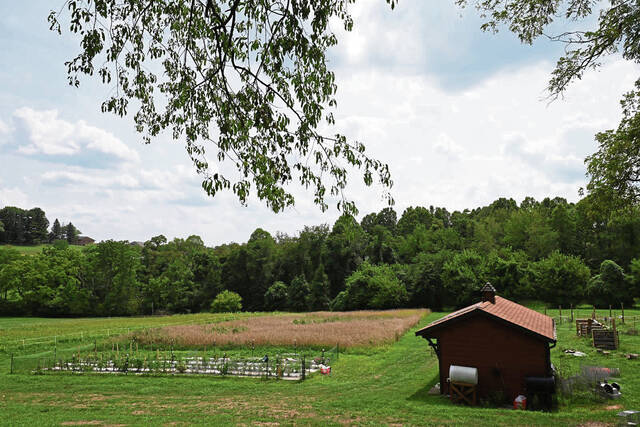Sisters of Charity's Greensburg harvest sends wheat on journey from field to mill to oven
When the Sisters of Charity of Seton Hill give thanks for their daily bread, they’ll know every step of how it arrived on their plates.
On Monday, the local community of 80 nuns harvested the first crop of wheat from the plantings near their Caritas Christi motherhouse in Greensburg.
The winter wheat originally was planted as a cover crop on an acre that previously yielded onions, and it was going to be tilled under to add nutrients to the soil.
But Sister Barbara Ann Smelko, the nuns’ garden project coordinator, had a better idea: “Why don’t we bake wheat bread?”
It will be the first time the kitchen at Caritas Christi has turned out fresh baked bread. In the past, the sisters have purchased their loaves.
“This will be very significant for us,” Smelko said. “In Catholic liturgy, the bread is the focal point of the service. There is something very special about bread.”
Wheat seed purchased from a local farm and garden store wasn’t planted in neat rows but was scattered and scratched under the soil, according to Darren Achtzehn, who is the sisters’ garden manager and also director of sustainability and outreach at adjacent Seton Hill University.
Still, he said, if he’d used a grain drill to plant the wheat more precisely, “I don’t think I could have gotten it to come in this thick.”
Harvesting the wheat stalks and turning them into grain — called wheat berries — requires a multi-step process involving cutting, thrashing and winnowing. To get the job done without applying intensive manual labor, the sisters acquired a 1945 Allis-Chalmers combine that was being retired from a farm near Oil City.
Weighing more than 900 pounds, “It was too large to pull down the highway, so we had to take it apart in three pieces,” Achtzehn said. “Originally, it was shipped to farms in four pieces. It was meant to be affordable for small farmers.”
According to Achtzehn, the combine had been operated continuously until recent years but required some tinkering to get it reassembled properly and ready for harvesting for the sisters.
“It was barn-kept and was in great working order, but it is 80 years old,” he said.
Once it’s performed its task for the Sisters of Charity, it will be covered by a tarp until they can arrange for a better way to store it.
Neither Achtzehn nor Smelko — who grew up in Pittsburgh’s Hazelwood neighborhood — have experience harvesting wheat, but they’ve received valuable advice from area farmers.
The resulting bushels of wheat berries will be taken to the gristmill at Saint Vincent Monastery in Unity, where they will be ground into flour ready for the sisters’ kitchen.
The two-hour process of pulling the combine through the field resulted in eight large sacks of wheat berries, likely to total about 45 bushels, Achtzehn said.
Wheat is the sisters’ most recent foray into agriculture — begun when they planted their first garden in 2015.
In September, they’ll harvest an acre of potatoes, sharing the yield.
“When we have a large harvest of something, one third goes to the Westmoreland County Food Bank, one third goes to our kitchen and one third goes to Seton Hill,” said Smelko.
The sisters’ other crops include tomatoes, peppers, cucumbers, gourds and blackberries. Some Seton Hill students help tend the plants.
Developing the garden has been an ongoing learning experience for Smelko.
“It’s been a journey,” she said. “I’m learning day by day.”
Jeff Himler is a TribLive reporter covering Greater Latrobe, Ligonier Valley, Mt. Pleasant Area and Derry Area school districts and their communities. He also reports on transportation issues. A journalist for more than three decades, he enjoys delving into local history. He can be reached at jhimler@triblive.com.
Remove the ads from your TribLIVE reading experience but still support the journalists who create the content with TribLIVE Ad-Free.





